Demand for networked services such as energy and water vary with changes in household and dwelling characteristics and can be inferred using spatial data. ECCD has developed tools for estimating aggregate demand for services across heterogenous geographical areas or populations providing enhanced planning capabilities for resilient future infrastructure.
By combining household (micro) data from both small sample experimental studies and large sample randomised control trials with spatially disaggregated household and dwelling characteristics, this modelling technique can be used to estimate ‘baseline’ consumption and consumption under a range of intervention scenarios.
An example of this work is the £10.3M Ofgem Low Carbon Network Fund (LCNF) project – Solent Achieving Value from Efficiency’ (SAVE) primarily focused on the Solent region and the key output from the project was the Network Investment Tool: a suite of models to improve the simulation of low-voltage distribution networks, informing future investment strategies of operators across the UK.
The SAVE project created a large-scale, representative sample of households and their electricity consumption. The industry leading sample underpins spatial microsimulation modelling, used to predict residential demand profiles for small geographical areas.
Another example is the modelling of residential water demand conducted for the IMPETUS project. This work provided estimates of UK residential water demand under a ‘baseline’ scenario and a range of water efficiency interventions, to model demand response to drought conditions and inform response measures.
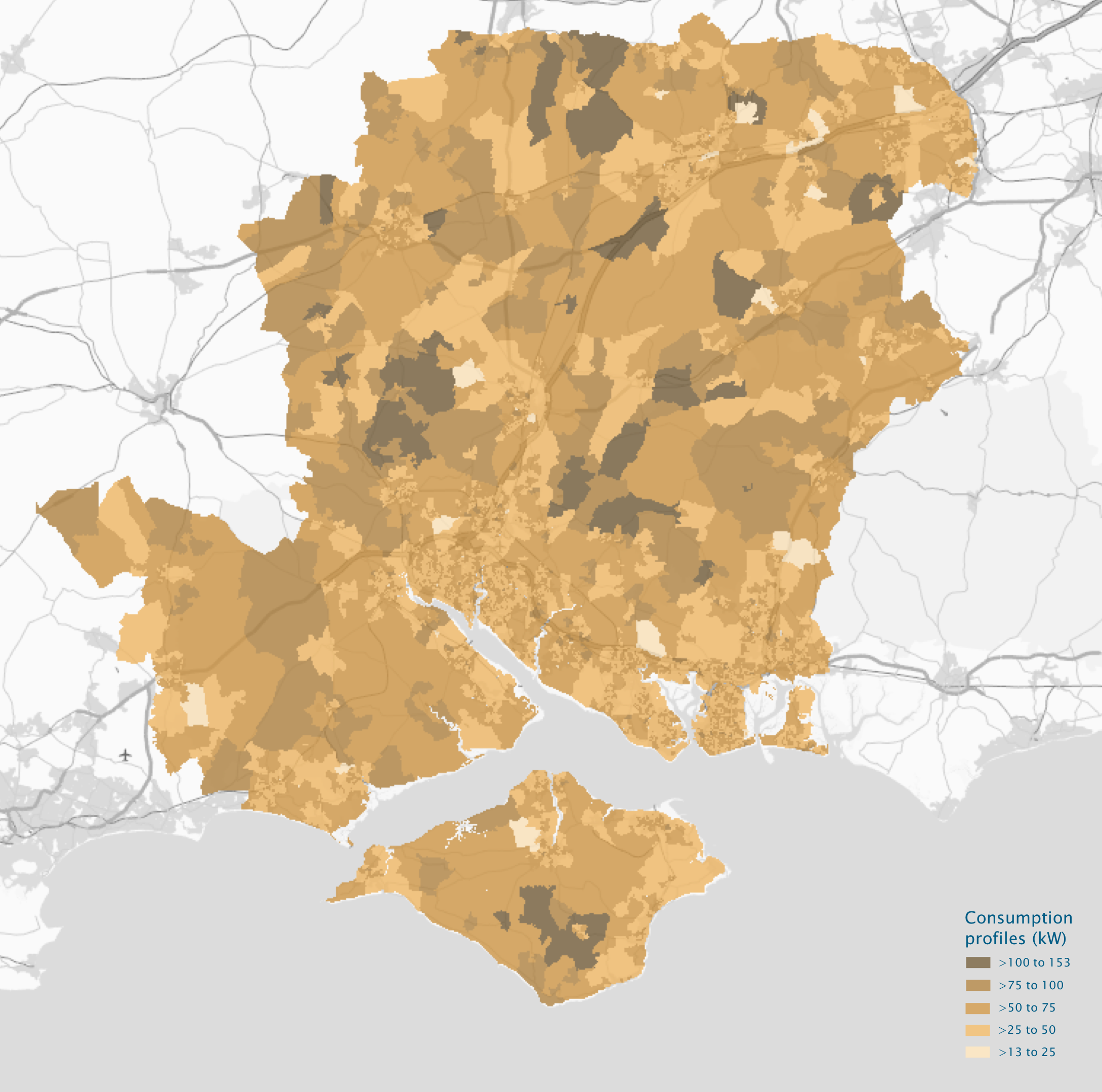
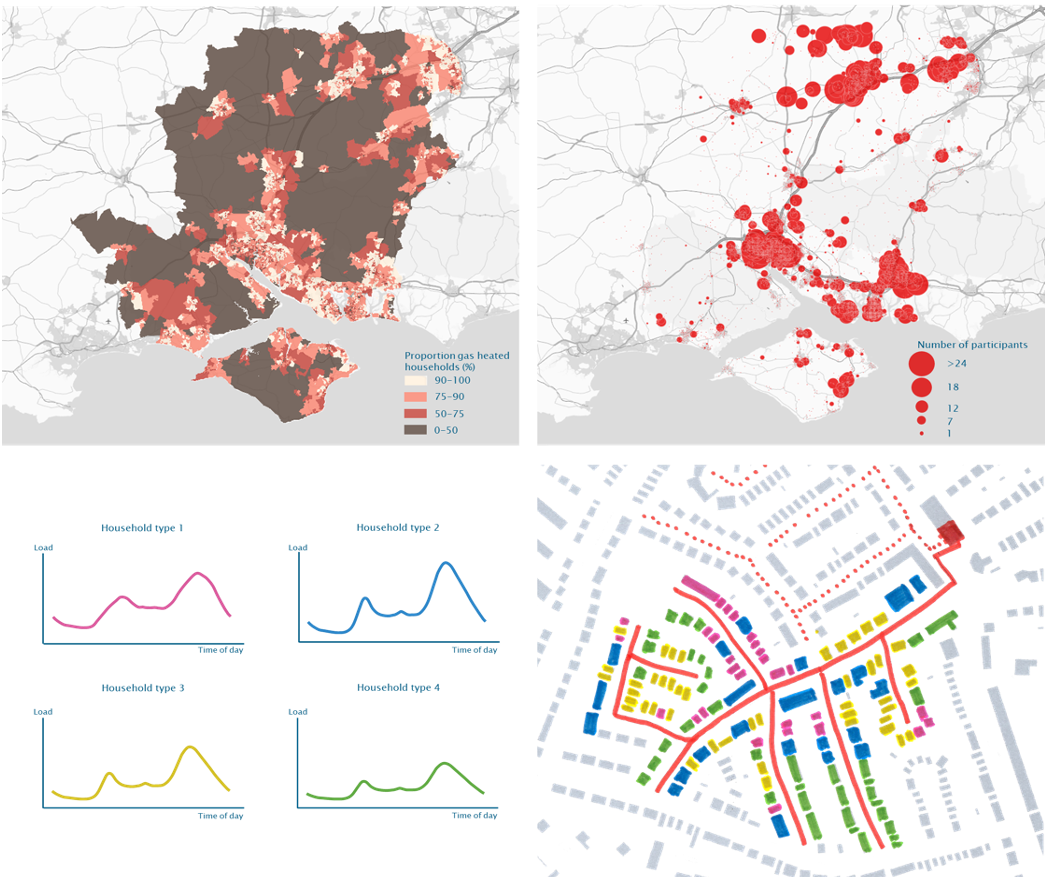
Updates:
Assessment of potential for rooftop solar PV in Hampshire and Sussex 2025 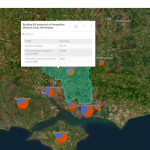
Rooftop solar means greater generation of renewable energy, closer to where it is used. However, understanding the possible scale of rooftop solar requires mapping the potential, building by building.
Guidelight – UK Power Networks, electricity distribution 2024 
Low-income and vulnerable consumers receive grant funded LCTs through local authority retrofit schemes, but without supporting households to switch tariffs or using digital optimisation tools, retrofit schemes risk creating a socio-technical performance gap that this project will evidence and address through a range of capability-based interventions that are tailored to those in vulnerable circumstances.
Overheating Risk Assessment for UK schools 2023 
This project is a response to the UK’s overheating risk introduced by climate change. By 2070, climate projections for the UK estimate an increase in seasonal average temperatures of up to 5.1°C in summer as well as more intense and frequent extreme events such as heat waves.
ECCD present preliminary LATENT field trial findings 2023 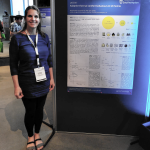
Having recently concluded the first heating season trial period for the LATENT field trial the research team have bee presenting preliminary findings at a number of events.
Sustainability Implementation Group 2022 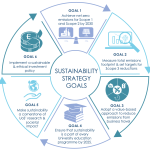
ECCD lead on the University Strategy-Sustainability, through the University Sustainability Implementation Group (SIG), setting the vision for a more sustainable University.
Renewable Energy in Saudi Arabia 2021 
Energy and Climate Change Division (ECCD) undertake research to support the Kingdom of Saudi Arabia’s (KSA’s) Vision 2030. The research is in collaboration with the Department of Electrical and Computer Engineering, King Abdulaziz University (KAU), supported by King Salam Bin Abdulaziz Chair in Energy Researcg and KSA Ministry of Education.
Whose flexibility is it anyway? 2021 
Authors: Ben Anderson & Tom Rushby The importance of flexibility for a zero-emissions electricity system continues to drive considerable research and socio-technical innovation across CREDS and its linked activities. Inherent in much, although not all, of this work is the notion that we need to find ways to enable flexibility at the consumer end of the ...
Hampshire Energy Mapping project 2021 
Investigator: Dr Ben Anderson Masters student: Meghan Kingsley-Walsh Hampshire County Council declared a Climate Emergency in June 2019 and have since set two targets for the County as a whole: To be carbon neutral by 2050 To be resilient to the impacts of a 2oC temperature rise It is becoming widely recognised that decarbonising national and local energy systems will ...
ECCD research contributes to New Zealand’s Climate Change Commission consultation 2021 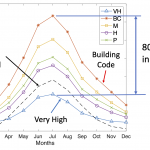
ECCD’s Dr Ben Anderson with Dr Michael Jack and Prof. Janet Stephenson from the University of Otago recently submitted a response to the New Zealand Climate Change Commission’s consultation on its first package of Advice to government. The submission focused on the results of modelling the impact of energy efficiency on space heating demand and, ...
SERL: Understanding habitual energy consumption 2021 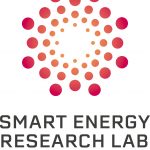
Investigators: Dr Ben Anderson (@dataknut), Prof Abubakr Bahaj Researchers: Dr Tom Rushby ECCD are conducting a new research project on habitual energy consumption as part of the Smart Energy Research Laboratory. Most research to date, including ECCD’s previous ESRC-funded Census2022 project, has analysed the shape of daily (24 hour) demand profiles and sought to understand which kinds of ...
ECCD research highlights value of energy efficient retrofit for New Zealand’s net-zero ambitions 2020 
Dr Michael Jack and Anthony Mirfin from the University of Otago and ECCD’s Dr Ben Anderson have developed a model which suggests that building and retrofitting New Zealand’s homes to the highest currently commercial viable energy efficiency level (PassivHaus) would reduce winter heat demand by up to 80% in peak winter months. Since future space ...
Ensuring statistics have power 2020 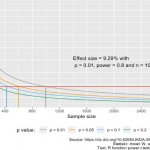
Convincing stakeholders to invest in high-quality, statistically robust research has not been an easy task. A further challenge is presented in communicating research findings and how they can be interpreted as actionable evidence. Through a recent project, SERG researchers developed guidance for both creators and users on the design, assessment and interpretation of applied energy research.
SAVE project modelling visualisation 2019 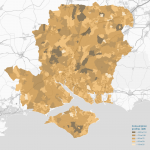
Mapped! Latest results from the SAVE spatial microsimulation model show how the level of residential electricity demand varies by time of day and by place across the Solent region.
The End of the World (Cup) 2018 
… for England. We didn’t plan the SAVE household sample recruitment and data collection period to over-lap with the 2018 World Cup but we had no end of fun when it did. We started out with some quick analysis of pick-ups (or not) of power demand during the game against Tunisia on June 18th before moving ...
UK household power demand and #worldcup2018 2018 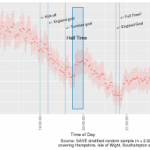
Author: Ben Anderson (b.anderson@soton.ac.uk, @dataknut) We recently posted a brief analysis of household power demand during the May 2018 Royal Wedding which showed a number of surges and dips associated with events in Windsor. In this post we switch to events in Russia – and specifically the first England game of World Cup 2018 (vs Tunisia). ...
SAVE: Data sources 2018 
The LCNF funded Solent Achieving Value from Efficiency (SAVE) project is collecting a range of data on household electricity demand. The data comprises electrical power demand, electrical energy consumption and a range of survey data on a large (n > 3,000) sample of households in the South East of England. The SAVE sample The SAVE sample is ...
Super Saturday and spikes in demand 2018 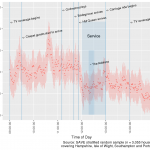
Author: Ben Anderson (b.anderson@soton.ac.uk, @dataknut) A while ago we posted a brief analysis of Christmas Day 2016 which showed that it was a most unusual Sunday. Although there was little evidence of positive ‘spikes‘ in household electricity demand due to synchronised behaviour, HM The Queen’s TV broadcast appeared to cause a distinct negative spike and there ...
SAVE: Solent Achieving Value from Efficiency 2018 
Investigators: Professor AbuBakr Bahaj, Dr Ben Anderson and Professor Patrick James. Researchers: Dr Tom Rushby, Dr Magesh Nagarajan, Dr Mikey Harper Contact: A.S.Bahaj@soton.ac.uk The Solent Achieving Value from Efficiency (SAVE) project was awarded £10 million under the Low Carbon Network (LCN) Fund and was carried out by a multidisciplinary consortium of academics, industry and consultants. The project, led ...
Liveable Cities – Case studies 2018 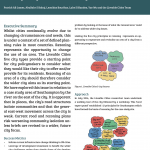
Alongside the Little Book Series, 9 Case Studies were produced from the Liveable Cities work to showcase the breadth and applicability of the Liveable Cities research to practice and everyday life.
SPATIALEC Global Fellowship launches 2017 
SERG’s Dr Ben Anderson has just started the outgoing phase of his EU H2020 Marie Skłodowska-Curie scheme-funded SPATIALEC Global Fellowship. Based at the University of Otago’s Centre for Sustainability, Ben will initially be working on combining time use and electricity monitoring data from the New Zealand GREEN Grid project with New Zealand Census data to produce ...
THERMOSS: Building and district thermal retrofit and management solutions 2017 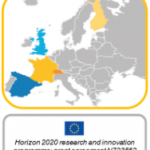
The THERMOSS project is a response to the 20% primary energy consumption reduction targets set by the 2012 European Energy Efficiency Directive (EED). This calls for effective and wide-scale building heating and cooling systems upgrade strategies. Such strategies will only be successful if they are based upon the right combination of technology innovation and ...
SERG research core to SSEN parliamentary event 2017 
SERG’s Dr Ben Anderson presented the SAVE study design and trial period 1 preliminary analysis at Scottish and Southern Energy Network’s Using Energy Efficiency to Defer Network Reinforcement parliamentary event at the Houses of Parliament on November 20th, 2017. With an introduction from Alan Whitehead MP (Shadow Minister (Department for Business, Energy and Industrial Strategy) (Energy ...
IMPETUS domestic hot water demand model presented at BECC 2017 2017 
Dr Despina Manouseli presented a poster on the IMPETUS domestic hot water demand model at the annual Behavior Energy and Climate Conference in Sacramento, California in October 2017. The poster presented a novel, practices-based approach to hot water demand estimation ‘under normal conditions’ using microsimulation to forecast seasonal demand at the household level under various water/energy conservation scenarios. The models suggest that the installation of ...
IMPETUS 'Water Cultures' domestic water demand review published 2017 
Full paper: Manouseli, D., Anderson, B. & Nagarajan, M. (2017) Domestic Water Demand During Droughts in Temperate Climates: Synthesising Evidence for an Integrated Framework, Water Resource Management. (Open Access) Abstract: Extreme weather events and variations that alter drought and flood frequency add to these pressures and there is therefore a need to develop evidence-based drought scenarios models for ...
Smart Energy Research Lab 2017 
Investigators: Dr Ben Anderson, Prof Abubakr Bahaj Researchers: Dr Tom Rushby SERG is part of a team led by UCL to deliver the new GB Smart Energy Research Lab (SERL) with funding from the UK Engineering and Physical Sciences Research Council. The Smart Energy Research Lab will provide a secure, consistent and trusted channel for researchers to access high-resolution ...
Modelling on-shore wind turbine locations 2017 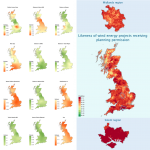
SERG PhD student Mikey Harper is working on a number of methods to assess the potential for wind turbine development in the UK. As part of this he has produced a map of on-shore wind turbine planning applications to date and has also developed a model for predicting the likelihood of planning success for future sites. To ...
SERG Researcher Dr Despina Manouseli Presents at "Efficient Use and Management of Water" Conference 2017 
The 9th biennial Specialist Conference on “Efficient Use and Management of Water” is held every two years in a different location around the world, has been the flagship water efficiency conference for the International Water Association (IWA). Efficient2017 was an opportunity for water efficiency professionals from all over the world to meet each other, network, and ...
Early SAVE results feature at project open days 2017 
SERG’s Dr Tom Rushby gave a summary of early SAVE project results at two SAVE ‘Open Days’ on the 10th & 11th of May 2017. The events, which were lead by SSEN but hosted by the University, consisted of a series of short talks and facilitated discussions intended to help inform the project’s future direction. Tom presented ...
Clean Carbon Event Poster: Solent Achieving Value from Efficiency (SAVE) 2017 
Solent Achieving Value from Efficiency (SAVE) project poster presented to the ‘Clean Carbon‘ USRG by SERG’s Dr Thomas Rushby, 10th May 2017 References list: EA Technology. Future Load Growth from presentation titled ‘SAVE Project Customer & Network Model Meeting’. 17th February 2015 Newsham, Guy R., and Brent G. Bowker. ‘The Effect of Utility Time-Varying Pricing and Load ...
Early SAVE results feature at University Clean Carbon Event 2017 
SERG’s Dr Tom Rushby gave a summary of the SAVE project to members of the University’s ‘Clean Carbon‘ USRG on the 10th May 2017. The event, which featured a keynote from Prof. Jon Gibbins, Director of the UK Carbon Capture and Storage Research Centre (UKCCSRC) on the state of CCS in the UK, consisted of ...
IMPETUS modelling work to be presented at IMA & IWA 2017 conferences 2017
Research results from the NERC-funded IMPETUS project will be presented at two upcoming conferences: the 6th World Congress of the International Microsimulation Association (IMA 2017) at Collegio Carlo Alberto in Moncalieri, Italy in June 2017; the IWA EFFICIENT Conference in Bath, UK in July 2017. The IWA Efficient paper will focus on the first version of the IMPETUS consumer water demand ...
IMPETUS researcher provides input to DEFRA REA 2017 
SERG researcher Dr Despoina Manouseli was interviewed recently to provide input to DEFRA’s Rapid Evidence Assessment on “behaviour change approaches to promote household water efficiency”. Despoina gave interviewer Collingwood Environmental Planning an overview of her PhD research on household water efficiency interventions and also drew on her recent IMPETUS work in this area. In particular she highlighted the ...
Author: Ben Anderson (b.anderson@soton.ac.uk, @dataknut) There is often talk in the media about the ‘spikes’ in energy demand caused by breaks in television schedules – when everyone is supposed to jump up and put the kettle on (or whatever). Although these make for good media stories, the largest overall surges are probably to do with cooking ...
Preliminary IMPETUS domestic water demand model results presented at IMA Europe 2016 conference 2016 
Dr Ben Anderson and Dr Magesh Nagarajan have presented preliminary results from the IMPETUS project at the 2016 European meeting of the International Microsimulation Association. The paper described their approach to modeling domestic water demand in England using a synthetic 1000 household dataset and demonstrated the results of an Agent Based Model to project water demand ...
New Census2022 paper published in the Computers, Environment and Urban Systems 2016 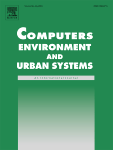
“Electricity consumption and household characteristics: Implications for census-taking in a smart metered future” briefly reviews the nature of current and future census taking in the UK before outlining the household characteristics that are to be found in the UK census and which are also known to influence electricity load profiles. The paper then uses the Irish CER ...
SPATIALEC: Marie Skłodowska-Curie EU Global Fellowship 2016 
Dr Ben Anderson of the Sustainable Energy Research Group (SERG) at the University of Southampton has been awarded a prestigious three year EU Global Fellowship under the Marie Skłodowska-Curie programme. The two year outgoing phase of the fellowship will be hosted by the University of Otago’s flagship Centre for Sustainability where Dr Anderson will be embedded in the ongoing ...
Demand modelling for infrastructure 2016 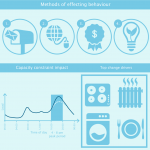
A key output from the Solent Achieving Value from Efficiency (SAVE) project mentioned on demand models for infrastructure resilience was the Network Investment Tool: a suite of models to improve the simulation of low-voltage distribution networks, thus better informing future investment strategies.
Potential of developing rooftop PV systems on SCC non-domestic buildings 2015 
This app shows the results of modelling roof panel PV generation for non-domestic Southampton City Council properties in Southampton, UK. Click on the ‘Large Map’ button to see the full interaction version hosted by ESRI/ArcGIS. The three buttons on the top right corner of the map can be used to “Search”, “Filter”, and “Change basemap”. Results are obtained ...
SERG ‘Customer Model Framework’ contribution to SAVE published 2015 
SERG’s first report for the LCNF funded SAVE project has been published. The report, “Report 2.1 – SAVE Customer Model Framework Specification“, lays out the applied research context for the SAVE Customer Modelling Framework (SCMF) and describes its key requirements. The report then outlines a microsimulation modelling approach than can meet these requirements and describes its conceptual foundations and method of ...
RENKEI Spring School – University of Southampton Southampton, UK, 22-29 March 2015 2014 
Theme: ‘District Energy Supply within Cities’ Date: 22-29 March 2015 Venue: University of Southampton Background RENKEI is the Japanese word for “collaboration” and in this context also stands for Research and Education Network for Knowledge Economy Initiatives. RENKEI is an initiative of six Japanese Universities, six UK Universities and the British Council Japan. The role of RENKEI is to offer a common ...
SERG wins new funding to model domestic water demand under drought scenarios 2014
SERG has secured funding to model domestic water demand under drought scenarios as part of the new NERC funded ‘IMPETUS‘ project. The project, to be lead by the University of Reading will start in June 2014 and run for 3 years. It is aiming to combine meteorological and hydrological models to produce drought ‘forecasts’ for ...
Liveable Cities 2013 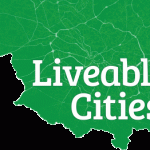
How do we address energy consumption to meet low carbon targets? How do we address infrastructure ‘lock in’ to improve the carbon performance of the urban environment? How do we engender and embed low carbon pathways and engineering solutions for demand reduction and power generation in cities? Introduction Launched in 2012, Liveable Cities is a five year £6.2m research ...
International Centre for Infrastructure Futures (ICIF) 2013 
Compared to many parts of the world, the UK has under-invested in its infrastructure in recent decades. It now faces many challenges in upgrading its infrastructure so that it is appropriate for the social, economic and environmental challenges it will face in the remainder of the 21st century. A key challenge involves taking into account ...
Census 2022: Transforming Small Area Socio-Economic Indicators through ‘Big Data’ 2013 
Census 2022: Transforming Small Area Socio-Economic Indicators through ‘Big Data’ is a project funded by the ESRC Transformative Research 2012/2013. Investigators: Dr Ben Anderson, Dr Patrick James & Prof. ‘Bakr Bahaj Contact: b.anderson@southampton.ac.uk The possible demise of the decennial UK Census presents social, policy and commercial researchers with both a challenge and an opportunity: The challenge is to transform ‘census-taking’ ...
DEMAND: Dynamics of Energy, Mobility and Demand 2013 
DEMAND: Dynamics of Energy, Mobility and Demand is one of 5 RCUK End User Energy Demand Research Centres and is sponsored by EPSRC/ESRC with support from partners EDF-Energy, Transport for London and the International Energy Agency. The Centre is led by the Universities of Lancaster & Leeds and besides Southampton also involves researchers from Aberdeen, Reading, Birmingham, UCL, ...
The role of community-based initiatives in energy saving 2011 
This ESRC-funded 4 year year study is assessing the impact of community greening groups on a roll out program insulation upgrades in privately owned housing. The project is led by Prof. Graham Smith, School of Social Sciences, University of Westminster.
Environmental Building Monitoring 2007 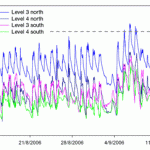
Several University of Southampton case study buildings of different age and state of repair have been monitored over longer time periods looking at environmental parameters such as temperature, relative humidity and carbon dioxide concentration. Measurements were made at five minute intervals over several weeks for each building. The scope of these studies was to identify ...
Ventilation Behaviour in Relation to Carbon Dioxide Concentration and Air Temperature 2006 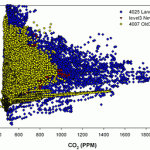
The carbon dioxide concentration levels normally observed in indoor environments range from 350 to 2,500 ppm and are typically between 500 and 1,500 ppm. Current literature suggests that a building’s carbon dioxide concentration can be seen as an indicator for both volatile organic component (VOC) concentration and general indoor air quality. However, the potential to ...
Exploring the value of transactional energy consumption data 2004 
The Exploring the value of transactional energy consumption data project is part of the wider ESRC funded Administrative Data Research Centre for England (ADRC) and will enable information routinely collected by government departments and other agencies, such as tax, education, health and consumption data, to be shared with researchers.
Using Energy Metering Data to Support Census 2021: A Feasibility Study 2004 
The possible demise of the decennial UK Census presents social, policy and commercial researchers with both a challenge and an opportunity. If we are no longer to be restricted to what can be asked in a Census, what kinds of social indicators might we want or be able to produce and when?

